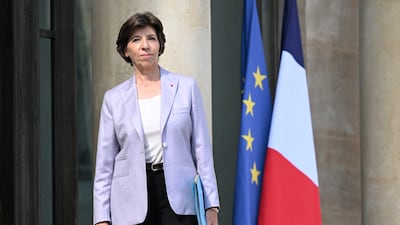Former French foreign minister Catherine Colonna is to lead a review of the UN agency for Palestinian refugees, after persistent criticism of the organisation from Israel.
UN Relief and Works Agency for Palestine Refugees in the Near East (UNRWA) commissioner general Philippe Lazzarini announced the review last month – before Israel accused 12 UNRWA employees in Gaza of taking part in the October 7 Hamas-led attacks on Israeli settlements.
About 1,200 people were killed in those assaults, and 240 abducted. In the retaliatory Israeli strikes and land offensive, more than 27,400 Palestinians have been killed in Gaza.
While Israeli Prime Minister Benjamin Netanyahu has long criticised UNRWA, the review has taken on added urgency as the accusations of its staff being involved in Hamas attacks have led major donors to suspend funding – jeopardising agency operations.
The job of Ms Colonna, 67, will be to assess whether UNRWA is “doing everything within its power to ensure neutrality and to respond to allegations of serious breaches when they are made”, UN Secretary General Antonio Guterres said on Monday.
The review will be supported by the Raoul Wallenberg Institute in Sweden, the Chr Michelsen Institute in Norway and the Danish Institute for Human Rights.
Work will start on February 14, with a final report made public in April.
It will be conducted in parallel to a UN investigation into Israeli accusations of staff taking part in the October 7 attacks. UNRWA dismissed 10 employees suspected of involvement. The other two are dead.
A solid diplomat
Ms Colonna is widely viewed in France as a solid diplomat despite losing her ministerial job in January's government reshuffle to European Parliament MP Stephane Sejourne.
A spokeswoman for former French president Jacques Chirac from 1994 to 2005, Ms Colonna has accumulated high-profile diplomatic postings abroad – including as ambassador to Italy and the UK.
As foreign minister, however, she was described in French media as “inaudible” compared to France's charismatic president Emmanuel Macron, who is heavily invested in foreign affairs.
Other French political heavyweights also stole the limelight since the October 7 attacks by travelling to the region in an attempt to de-escalate tensions – including Mr Macron's special envoy to Lebanon, Jean-Yves Le Drian.
Daily Le Monde also described Ms Colonna as “irritated” by a protest letter signed by French ambassadors in the Middle East warning against what they viewed to be France's pro-Israeli positioning on the Gaza conflict.
Mr Macron's proposal to fight Hamas with a coalition was widely derided by the French diplomatic corps and regional partners.
The proposal, according to Le Monde, was made by Mr Macron without consulting Ms Colonna, signalling a lack of communication between the ministry and the Elysee Palace.
France has, however, succeeded in the past months to strike a unique position on the conflict among its Western partners by adopting a position that is not perceived as either excessively pro-Israel or pro-Palestinian.
By calling for a ceasefire as early as November, Mr Maron adopted a different strategy to Israel's closest Western allies, such as Germany and the UK.
Yet he has not gone as far as supporting South Africa's case against Israel at the International Court of Justice in The Hague or calling on a revision of the EU's relations with Israel – a proposal put forward last week by Ireland.
Mr Macron has also stressed the need to respond to the war with diplomacy, not military escalation.
For this reason he has not involved France in strikes on Houthi rebel positions in Yemen. These have been led by the US, with the support of the UK, Denmark and the Netherlands.
By choosing a French diplomat to lead the UNRWA review process, the UN is likely to have wanted to send a signal of even-handedness, as the topic becomes increasingly controversial.
Some donors, such as the EU and Sweden, have said they would determine a decision on restoring funding to UNRWA's review.
UNRWA said that the recent pauses in funding has amounted to $440 million. It said if that that money is not restored soon, it might have to stop operations this month.
The EU's top diplomat Josep Borrell warned earlier this week that “UNRWA’s demise would also be a serious risk for regional stability”.
The agency employees 13,000 staff in Gaza and 30,000 across the Middle East. They support millions of Palestinian refugees with emergency humanitarian aid and essential services including schooling and health care.


